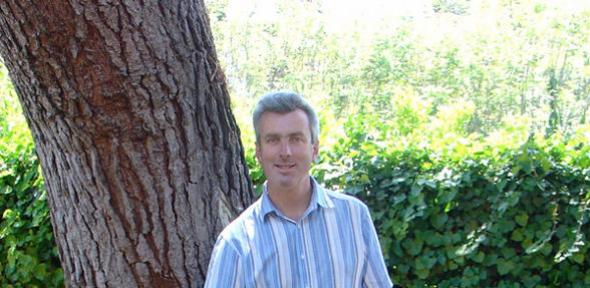
The Royal Academy of Engineering offers Global Research Awards to support engineering academics to spend a period working abroad. This is a well funded scheme, with a high rate of funding success, but so far only one application has been made from Cambridge. Jaq Saggers talked to Julian Allwood about his experience of the award.
In the five years prior to applying for this award, Julian had been building up a research group in Cambridge exploring the possibility that computer control can be substituted for fixed tooling in metal forming processes. He knew what he wanted to spend his sabbatical year working on, and there are many universities where Incremental Sheet Metal Forming is being developed. He decided he would like to go to the University of Palermo in Sicily.
It was a one off chance to take his family overseas as his children were aged 8, 7 and 5 and as sabbaticals happen every 7 years by the next one, one of his daughters will be taking her GCSEs.
Julian applied to the Leverhulme sabbatical fund but was unsuccessful. He applied for the Global Research Award the Christmas before they went, and the money was awarded by the following Easter, 6 months before they left. Julian was awarded £35K half of which was for personal use half to fund a structured set of visits to leading Universities and Companies across Europe working on flexible metal forming technologies.
His hosts at the University of Palermo helped to find him a school for his children which worked out very well and which Julian feels was the key to the trip being a success. Unfortunately the children's school places in Cambridge were not held open, (this is the norm if a child is away for more than 6 weeks) so his children are now at another school, but Julian feels this is a minor inconvenience and that the trip was such a positive experience for the children, the benefits far out weigh any of the disadvantages. His hosts also helped with the other logistics like finding a place to live in Palermo. Julian and his family rented out their house here in Cambridge.
Julian's wife is a GP who had been working part-time since having the children, she was able to give up her job and was able to find part-time locum work when they returned.
Julian arrived with his family in Palermo on 1st September 2006 and departed on 31st July 2007. His visit was hosted by Professor Fabrizio Micari at the Dipartimento di Tecnologica Meccanica, at the University of Palermo. Professor Micari is one of the two leading Italian professors of metal forming, and is also currently president of the Italian Manufacturing Association AITEM. Like Julian, he works on Incremental Sheet Forming, and has wide experience of work in metal forming.
Julian says "This was my first sabbatical, and I was surprised how email put me more closely in contact with my ongoing activities in Cambridge than I’d anticipated. This had many benefits – I secured two new contracts for research projects in the area of flexible forming during the year, both leading to recruitment of new PhD students who have now started – but it also took more time than I would have hoped, up to two days per week. As a result, I worked longer hours than I had intended, in order to complete the planned programme of work. In fact, with the many visits that were part of the programme, and a few return trips to Cambridge to see my research students (whom I otherwise contacted regularly by “Skype”), the year was significantly more busy than I had expected.
"My family had a wonderful year - staying continuously in Palermo, despite my various trips away. In particular my three young children attended an excellent local school, where only Italian was spoken, and had a very positive experience. For the first 6 months, they worked hard on the language – they were set two hours of homework per day, six days per week, but it took longer with the need for translation. However, by February/March they were in effect “fluent” within their own age-group (and much more competent with the language than my wife or me!) and were then fully absorbed in the school’s activities. The Italians are famously fond of children, and my own thrived in the supportive and caring environment in which they found themselves.
"A feature of the Southern Italian style of working – the “Mediterranean Way” as they call it – is a much higher degree of uncertainty about planning than I am used to. Although this is to some extent a cultural cliché, it meant that some of the plans made before the year did not develop, but equally, other opportunities emerged. I visited fewer companies than I’d intended within Italy, but more universities (my hosts were keen that we should make as many visits as possible to Italian universities, and accompanied me in most instances.) However, having earnt some speaker fees giving seminars, I was able to extend the original travel plans to include time in Slovenia, Denmark and Poland, and a return visit to Padova, and this gave other opportunities for company visits. In fact, the travel component of the grant had two unexpected consequences: in June I was appointed joint editor-in-chief of the Journal of Materials Processing Technology, which is the central journal to the area in which I work; in August I was elected secretary to the Scientific Technical Committee on Forming of the CIRP – the leading metal forming academic society – which will lead to me becoming its chairman in six years time. Both of these appointments were made by the ‘community’ of metal forming academics, and as I understand it, are a direct result of the visits I made during this year.

